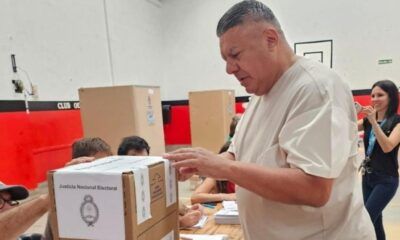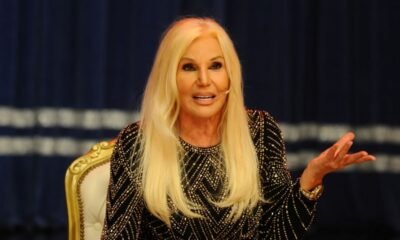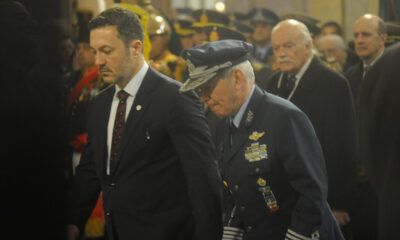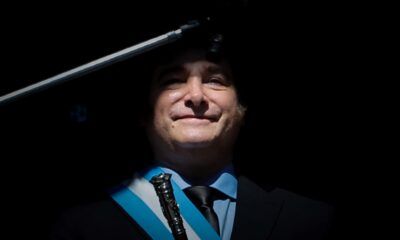INTERNACIONAL
Indian PM Modi to visit Ukraine after controversial Moscow meeting

- Indian Prime Minister Narendra Modi is set to meet with Ukrainian President Volodymyr Zelenskyy during a visit to Ukraine on Friday.
- The meeting follows Modi’s recent visit to Russia, where he hugged Russian President Vladimir Putin. It will focus on boosting economic ties and cooperation in defense, science and technology.
- Analysts say Modi’s Ukraine visit could be an attempt to appear as a neutral party, since India has come to be seen as closer with Russia.
Indian Prime Minister Narendra Modi is set to meet with Ukrainian President Volodymyr Zelenskyy in a historic visit Friday to Ukraine, a month and a half after he traveled to Moscow to hold talks with President Vladimir Putin.
Officials in India and Ukraine have said the visit will focus on boosting economic ties and cooperation in defense, science and technology.
But analysts say the visit could also be an attempt to have India strike a more neutral stance after what has been seen as a lean toward Russia, given Modi’s recent Moscow visit, his country’s historic, Cold War-era relationship with Russia and New Delhi’s avoidance of directly criticizing Russia over its invasion of Ukraine.
Russian President Vladimir Putin, right, awards Indian Prime Minister Narendra Modi with the Order of St. Andrew the Apostle the First-Called at the Kremlin in Moscow, Russia, on July 9, 2024. (AP Photo/Alexander Zemlianichenko, File)
Why is Modi visiting Ukraine?
Modi’s landmark visit is the first to Ukraine from a prime minister of India since the country established diplomatic relations with Ukraine over 30 years ago. He will arrive in Kyiv after a two-day visit to Poland.
Analysts say the timing of the trip is aimed at controlling fallout from the Indian leader’s July 8-9 trip to Russia.
That trip coincided with a NATO leaders gathering in Washington and Russian missile strikes on a hospital in Ukraine that killed scores of people, drawing strong criticism from Zelenskyy. The Ukrainian leader called Modi’s meeting «a huge disappointment» and «a devastating blow to peace efforts» after the Indian leader was seen hugging Putin.
While Modi did not address the missile strikes directly, he alluded to the bloodshed while sitting next to Putin, and condemned any attack that harms innocent people.
This week’s Ukraine trip represents India «trying to balance the situation» after being seen as «tilting towards Russia,» said K C Singh, a strategic affairs expert and former diplomat.
Indian officials are downplaying any connections with the Moscow trip. «This is not a zero-sum game … these are independent, broad ties,» Secretary (West) Tanmaya Lal said this week.
Despite pressure from the West, New Delhi has refrained from condemning Russia’s invasion or voting against it in U.N. resolutions. It has avoided taking sides and urged Ukraine and Russia to resolve the conflict through dialogue.
«Modi’s visit is designed to some extent to show that New Delhi’s strategic orientation remains non-alignment, and as such, to keep balance in its foreign policy,» said Derek Grossman, an Indo-Pacific analyst at the RAND Corporation.
What are India’s ties to Russia?
India and Russia have had strong ties since the Cold War, and New Delhi’s importance as a key trading partner for Moscow has grown since the Kremlin sent troops into Ukraine in February 2022.
India has joined China in becoming a key buyer of Russian oil following sanctions imposed by the United States and its allies that shut most Western markets off to Russian exports.
Modi’s visit to Moscow was seen by analysts as reinforcing their partnership, especially since Russia remains a crucial trade and defense partner. Some 60% of India’s military systems and hardware is of Russian origin, and New Delhi now gets more than 40% of its oil imports from Russia.
Trade between the two has also seen a sharp increase, touching close to $65 billion in the 2023-24 financial year, according to India’s foreign ministry.
What about India’s ties to Ukraine?
Bilateral trade between India and Ukraine is much lower, at about $3 billion before the invasion, but Modi and Zelenskyy have interacted since on the sidelines of global events and the Ukrainian foreign minister also visited New Delhi earlier this year.
India has also provided several consignments of humanitarian assistance to Ukraine since the invasion.
Analysts say Zelenskyy is unlikely to raise Modi’s meeting with Putin – at least publicly.
But Modi’s Moscow visit and the India-Russia relationship will be a «strong undertone» to his Ukraine trip, even if it not explicitly mentioned in public statements, added Chietigj Bajpaee, who researches South Asia at the Chatham House think tank.
How will this trip be perceived?
The trip is likely to be well-received in the U.S. and other Western countries that had been critical of Modi’s meeting with Putin in July, Grossman said.
For Modi, this trip is an opportunity «to engage Zelenskyy and secure Indian interests there, push back against Russian overreach and placate the West,» Grossman added.
But while the trip will offer some reassurance to the West, it will remain clear that India maintains a closer relationship with Moscow and «Modi’s visit will not change this perception,» Bajpaee said.
CLICK HERE TO GET THE FOX NEWS APP
Modi is unlikely to use this visit to seek a role for India as a peacemaker in the conflict, which some had speculated it would do at the onset of the war given New Delhi’s ties to Russia and emerging stature globally.
«Indian behavior… has been to try to stay out of resolving it, and to only occasionally comment against further aggression,» said Grossman, adding that India — unlike China or Turkey — hasn’t come forward with a peace plan, for example.
Meanwhile, the Kremlin will be observing Modi’s visit, «but short of any statements that are highly critical of Russia, it is unlikely to be concerned,» Bajpaee said.
INTERNACIONAL
Top Russian official lands in Iran amid US, UK concerns over alleged nuclear deal

Top Russian security official Sergei Shoigu landed in Iran on Tuesday for talks with his counterpart just one day after reports surfaced suggesting the U.S. and the U.K. are increasingly concerned over an alleged nuclear deal between Tehran and Moscow.
Details of Shoigu’s meeting in Iran remain scarce, but U.S. officials have increasingly begun sounding the alarm that the burgeoning relationship between Iran and Russia amid the war in Ukraine may have reached concerning new levels.
Secretary of State Antony Blinken first referenced these concerns last week during a visit to the U.K., where he confirmed reports that Iran had supplied Russia with short-range ballistic missiles to aid its continued war effort against Kyiv.
Security Council’s Secretary Sergei Shoigu in St. Petersburg, Russia, Sept. 12, 2024. (Sputnik/Kristina Kormilitsyna/Kremlin via Reuters)
RUSSIA, CHINA HOLD BIGGEST WAR GAMES SINCE SOVIET ERA
But in comments that largely fell under the radar given the confirmation that ballistic missiles had been given to Moscow, Blinken also said, «Russia is sharing technology that Iran seeks – this is a two-way street – including on nuclear issues as well as some space information.»
A report by The Guardian on Monday suggested that President Biden and U.K. Prime Minister Kier Starmer allegedly discussed the potential of a secret deal having been forged in which Russia has agreed to provide Iran with the technological know-how it needs to develop a nuclear weapon.
Nuclear experts, including the U.N.’s own watchdog, the International Atomic Energy Agency (IAEA), have warned that Tehran has continued to develop its nuclear program unchecked for the last three and half years.
Iran is said to have increased its stockpiles of highly enriched uranium to levels of 60% purity – just shy of weapons-grade uranium, which is achieved with 90% purity levels.
While information surrounding Shoigu’s meeting Tuesday remains unknown, his trip came just days after he traveled to fellow nuclear-armed nation, North Korea, and met with leader Kim Jong Un in Pyongyang.

North Korean leader Kim Jong Un meets with a delegation led by Sergei Shoigu, in this photo released by North Korea’s official Korean Central News Agency, Sept. 14, 2024. (KCNA via Reuters )
UKRAINE HITS MOSCOW IN LARGEST DRONE STRIKE SINCE WAR BEGAN
Details of that trip also remain murky, but reports suggested Shoigu’s trip was an opportunity to deepen the Russia-North Korea partnership following the signing of a mutual defense treaty in June earlier this year.
Western nations have accused North Korea of supplying Russia with arms to aid its war effort in Ukraine, and concerns have mounted that Pyongyang could escalate its military deliverables to Moscow.
The U.S. and its Western allies have pledged to hold nations accountable for aiding Russia in its illegal war in Ukraine, but Shoigu’s trips with the top adversarial nations coincided with threats leveled by Putin at Washington last week.
Neither the U.S. nor the U.K. have lifted their strike bans on Ukrainian supplied long-range weapons in order to permit Kyiv to strike deep into Russia – a move it argues is critical for ending the war with Moscow.
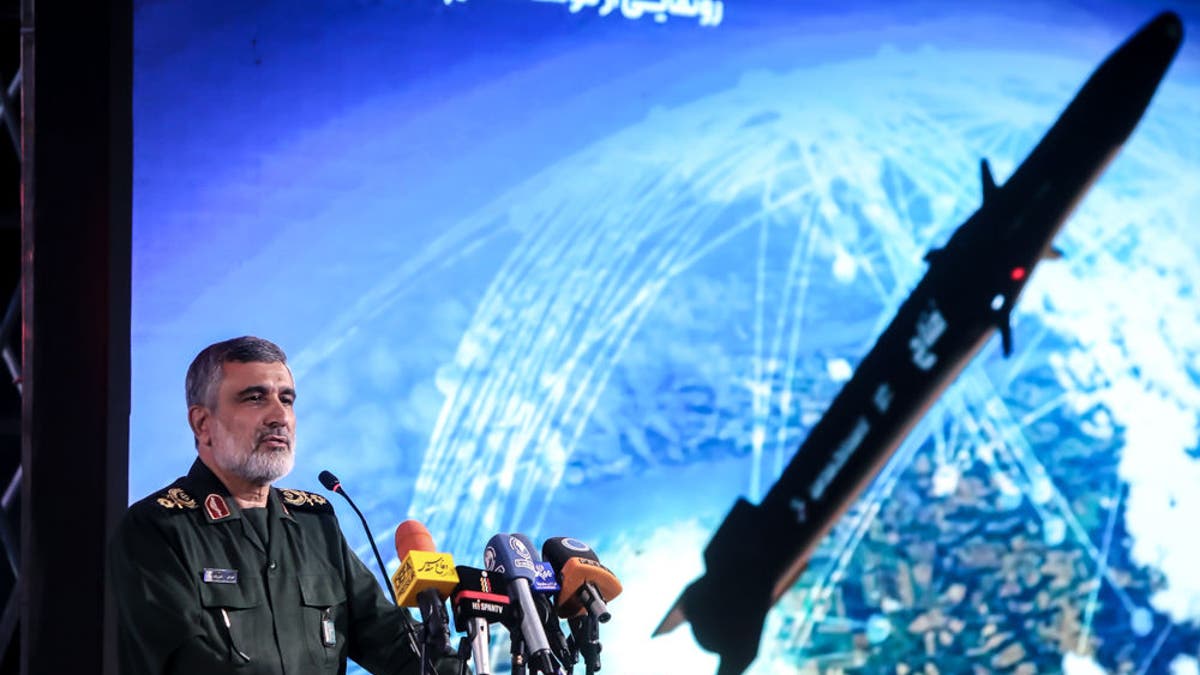
Amir Ali Hajizadeh, commander of Aerospace Force of the Islamic Revolutionary Guard Corps, gives a speech as Iran presents its first hypersonic ballistic missile in Tehran on June 6, 2023. (Sepah News/Handout/Anadolu Agency via Getty Images)
CLICK HERE TO GET THE FOX NEWS APP
But Putin last week said any move by the U.S. and its NATO allies to reverse these strike bans will be seen as its direct involvement in the conflict and would mean they are «at war» with Russia – possibly extending the threat of a Russian strike outside of Ukraine.
Putin has made these threats against the West before, though no strike ban reversals were announced during the top meetings last week between Biden and Starmer.
Reuters contributed to this report.
-
CHIMENTOS3 días ago
El gobierno interfiere con la agenda cultural de Susana Giménez
-
POLITICA2 días ago
Las chicanas de Javier Milei a Germán Martínez cuando le pidió que no leyera: “Los invito a despejar la x”
-
POLITICA2 días ago
Se calienta la interna en la UCR: Luis Petri salió a defender a los legisladores que apoyan a Javier Milei y le pegó duro a Martín Lousteau
-
CHIMENTOS3 días ago
Fuerte acusación de Viviana Canosa contra el presidente
-
POLITICA2 días ago
A horas de su discurso en el Congreso, una nueva encuesta muestra números muy positivos para Milei
-
POLITICA23 horas ago
A fin de mes se definiría la condena a Cristina Kirchner por la causa Vialidad

















